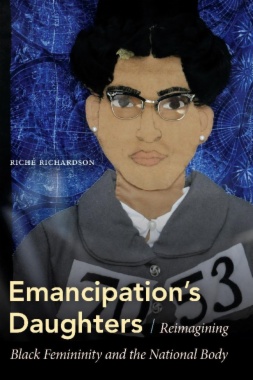In Emancipation's Daughters, Riché Richardson examines iconic black women leaders who have contested racial stereotypes and constructed new national narratives of black womanhood in the United States. Drawing on literary texts and cultural representations, Richardson shows how five emblematic black women—Mary McLeod Bethune, Rosa Parks, Condoleezza Rice, Michelle Obama, and Beyoncé—have challenged white-centered definitions of American identity. By using the rhetoric of motherhood and focusing on families and children, these leaders have defied racist images of black women, such as the mammy or the welfare queen, and rewritten scripts of femininity designed to exclude black women from civic participation. Richardson shows that these women's status as national icons was central to reconstructing black womanhood in ways that moved beyond dominant stereotypes. However, these formulations are often premised on heteronormativity and exclude black queer and trans women. Throughout Emancipation's Daughters, Richardson reveals new possibilities for inclusive models of blackness, national femininity, and democracy.
- Cover
- Contents
- Preface
- Acknowledgments
- Introduction: An Exemplary American Woman������������������������������������������������
- 1. Mary McLeod Bethune’s “My Last Will and Testament” and Her National Legacy
- 2. From Rosa Parks’s Quiet Strength to Memorializing a National Mother
- 3. America’s Chief Diplomat: The Politics of Condoleezza Rice from Autobiography to Art and Fashion
- 4. First Lady and “Mom-in-Chief”: The Voice and Vision of Michelle Obama in the Video South Side Girl and in American Grown
- Conclusion: Beyoncé’s South and the Birth of a “Formation” Nation
- Notes������������
- Bibliography�������������������
- Index������������
- A
- B
- C
- D
- E
- F
- G
- H
- I
- J
- K
- L
- M
- N
- O
- P
- Q
- R
- S
- T
- U
- V
- W
- Y
- Z

